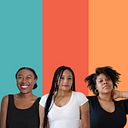I Was Raised in the Black Church But I’m Struggling to Have Faith
With Church so ingrained in Black culture, I feel like an outsider trying to break away.
Like almost everything in this country, the relationship between Christianity and Black people have a disturbing past. Slaveowners used to cite passages that commanded servants to obey in order to use the Bible to justify slavery. During the time of slavery, owners would allow slaves to listen to sermons and over time African Americans reclaimed the Bible and its message of liberation (Washington Post). During segregation, Black churches was an important space for racial solidarity and faith more broadly was a source of hope and inspiration.
My family’s roots are from the South so religion had a huge influence on how they grew up. When I was younger I lived above my grandma and I remember every Sunday going to Sunday School. I don’t think I really understood the lessons and exactly what the Bible was saying until I got older. My family was never strict with religion but we said grace before each meal and prayed each night before going to bed. They made sure I knew the true meaning of Easter and Christmas but when I moved an hour away from my church I stopped going frequently. As I got older and became more liberal, it was unsettling when I would hear sermons that were homophobic and sexist. I started to realize that the Bible had flaws since it was written by a human and that many people would use religion as a way to be hateful. It was the modern day times of people using the religion to justify slavery. The same people who use the book to be homophobic or racist don’t use the same arguments when they are not virgins or had children out of wedlock.
I loved learning about religion in college and it opened my eyes to many views. I didn’t have an issue with the basis of religion. I think religion is a great way to bring people together and keep people to their morals. The real issue I had was human tainting to religion. But the reality is I believe there are more hateful people who are religious versus their counterparts. I no longer wanted to go to the Church because I didn’t want to hear comments from judgmental people or hear homophobic sermons. So I decided that I would no longer attend and there would be nobody in the way between my relationship with me and God.
It seems like many people of my generation feel the same way (I am in the middle of Gen Z and millennial). According to Pew Research, Black Millennials and Gen Z are less likely to rely on prayer, less likely to have grown up in Black churches and less likely to say religion is an important part of their lives. 1 in 5 Black Americans (21%) are not affiliated with any religion and instead identify as atheist, agnostic or “nothing in particular,” and this phenomenon is increasing by generation: Roughly 3 in 10 Black Gen Zers (28%) and Millennials (33%) in the survey are religiously unaffiliated, compared with just 11% of Baby Boomers and 5% of those in the Silent Generation. However, Black Americans are more religious than the American public as a whole on a range of measures of religious commitment.
This trend will only increase with future generations unless the church changes. I had always imagined raising my kids in the Black church because I felt like it was just part of the experience of being Black. But as I grow away from the church, I am unsure. The Bible was written so many years ago. Similar to the Constitution, some things are going to be outdated with the current times. If the church wants future generations of Black Americans, they need to realize that we have a low tolerance for things like sexism, homophobia and hate in general. Religion has good intent. It is great for community. So let’s remember to keep our morals and remove our judgment and hate from religion and maybe we can see more Black Americans make their way back to hands of the church.
In this episode, the So-Called Oreos sit down to discuss all things religion and spirituality as they grapple with not fully believing in things that are common in the Black community. After giving a history lesson and stats on the current relationship between Black people and religion, the hosts discuss their religious upbringing, the importance of church in Black culture and why they have issues with the church and organized religion. The three touch on the recent backlash that Lil Nas X received as well as how your relationship with men can effect your relationship with God. Kia explains how she has struggled connecting with other forms of spirituality while Amari and Janae express when they feel most spiritual before reading audience responses on the topic.
The So-Called Oreos Podcast is available on all podcast platforms! Please support by rating, following and leaving a review!
Join us on Discord!: discord.gg/d3RrepdTdQ
So-Called Oreos Club: www.joinclubhouse.com/club/so-called-oreos
Email: socalledoreos@gmail.com
Twitter: @socalledoreos
Instagram: @socalledoreos
Facebook: www.facebook.com/socalledoreos/
YouTube: bit.ly/3nutxC2
Audience Survey: bit.ly/2vOYtH9
